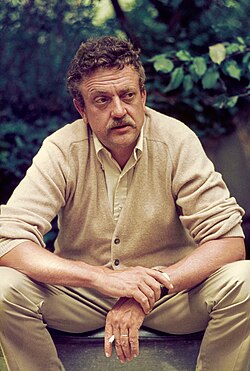Kurt Vonnegut Quote
I love you sons of bitches. You’re all I read any more. You're the only ones who’ll talk all about the really terrific changes going on, the only ones crazy enough to know that life is a space voyage, and not a short one, either, but one that’ll last for billions of years. You’re the only ones with guts enough to really care about the future, who really notice what machines do to us, what wars do to us, what cities do to us, what big, simple ideas do to us, what tremendous misunderstanding, mistakes, accidents, catastrophes do to us. You're the only ones zany enough to agonize over time and distance without limit, over mysteries that will never die, over the fact that we are right now determining whether the space voyage for the next billion years or so is going to be Heaven or Hell.
I love you sons of bitches. You’re all I read any more. You're the only ones who’ll talk all about the really terrific changes going on, the only ones crazy enough to know that life is a space voyage, and not a short one, either, but one that’ll last for billions of years. You’re the only ones with guts enough to really care about the future, who really notice what machines do to us, what wars do to us, what cities do to us, what big, simple ideas do to us, what tremendous misunderstanding, mistakes, accidents, catastrophes do to us. You're the only ones zany enough to agonize over time and distance without limit, over mysteries that will never die, over the fact that we are right now determining whether the space voyage for the next billion years or so is going to be Heaven or Hell.
Related Quotes
About Kurt Vonnegut
Born and raised in Indianapolis, Vonnegut attended Cornell University, but withdrew in January 1943 and enlisted in the U.S. Army. As part of his training, he studied mechanical engineering at the Carnegie Institute of Technology and the University of Tennessee. He was then deployed to Europe to fight in World War II and was captured by the Germans during the Battle of the Bulge. He was interned in Dresden, where he survived the Allied bombing of the city in a meat locker of the slaughterhouse where he was imprisoned. After the war, he married Jane Marie Cox. He and his wife both attended the University of Chicago while he worked as a night reporter for the City News Bureau.
Vonnegut published his first novel, Player Piano, in 1952. It received positive reviews yet sold poorly. In the nearly 20 years that followed, several well regarded novels were published, including The Sirens of Titan (1959) and Cat's Cradle (1963), both of which were nominated for the Hugo Award for best science fiction or fantasy novel of the year. His short-story collection, Welcome to the Monkey House, was published in 1968.
Vonnegut's breakthrough was his commercially and critically successful sixth novel, Slaughterhouse-Five (1969). Its anti-war sentiment resonated with its readers amid the Vietnam War, and its reviews were generally positive. It rose to the top of The New York Times Best Seller list and made Vonnegut famous. Later in his career, Vonnegut published autobiographical essays and short-story collections such as Fates Worse Than Death (1991) and A Man Without a Country (2005). He has been hailed for his darkly humorous commentary on American society. His son Mark published a compilation of his work, Armageddon in Retrospect, in 2008. In 2017, Seven Stories Press published Complete Stories, a collection of Vonnegut's short fiction.
